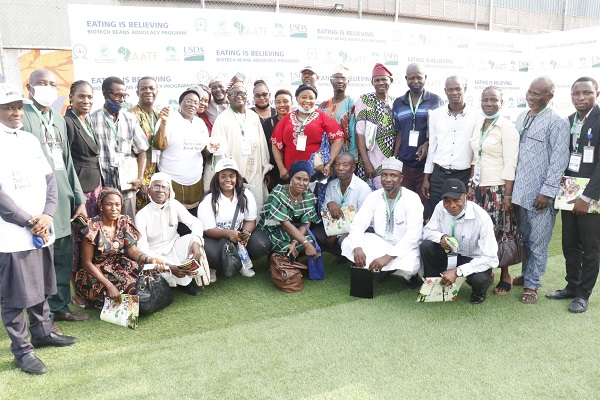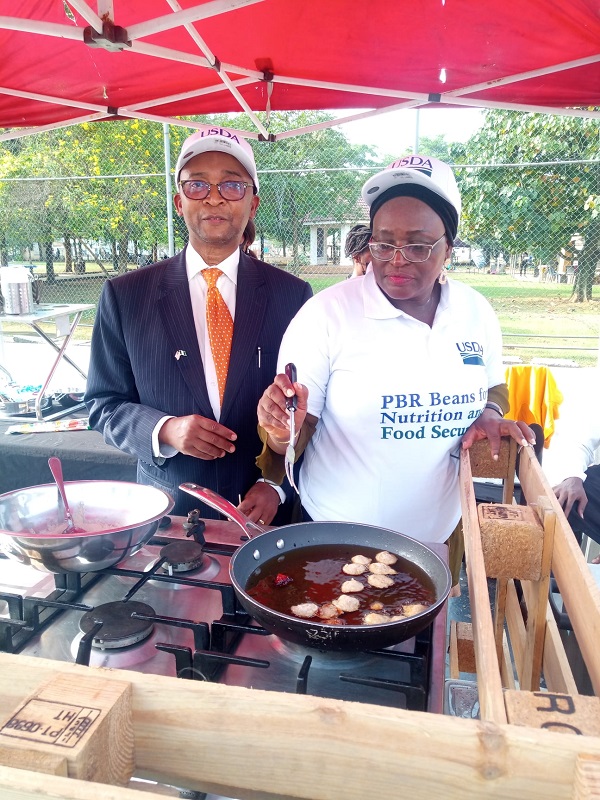
The Open Forum on Agricultural Biotechnology in Africa (OFAB), Nigeria Chapter and the African Agricultural Technology Foundation (AATF) in collaboration with the United States Department of Agriculture (USDA) have stressed that the rationale behind the recently launched the genetically modified beans’ ‘Eating is Believing’ (EIB) campaign in Lagos, is to get people to embrace the new product and to do away with perceptions that it could taste or look different.
The campaign is to promote the newly-introduced PBR Cowpea, a genetically modified product, as good for consumption and as safe as other conventional products.
In his remarks, the counsellor for agricultural affairs (for Nigeria, Benin and Cameroun), U.S. Consulate, Mr. Gerald Smith, said that cowpea/bean is incredibly nutrient-dense and rich in vitamins A and C – including micronutrients – and that there is abundant scientific evidence that there is no nutritional difference between the new beans and others.
According to him, the common misconception about biotech crops is that the modification process changes the food’s traits is, more than anything else “baseless”. With the campaign which affords the stakeholders opportunity to eat the beans publicly, the diplomat confirmed that the new beans taste the same as the conventional one and “might even be better”.
Smith, speaking before participants drawn from among the nutritionists, professional food caterers, food scientists, plant breeders, farmers, media and industrialists, said the consumption of this new and tasty variety of beans demonstrates the food safety and nutrition effects of the PBR cowpea.

In her remarks, the country coordinator, OFAB, Nigeria Chapter, Dr. Rose Gidado, maintained that it will not only assure consumers of the safety of the PBR cowpea but will facilitate market and consumer acceptance and increase stakeholder awareness, especially the smallholder farmers. “When this is done, Nigeria will record several champions promoting the planting of Bt. cowpea across Nigeria.”, she said.
Also, Gidado revealed that the USDA, Lagos, plans to incorporate the campaign into a prospective USDA’s McGovern-Dole school feeding programme across Nigeria’s southwestern states.
Going further, the president, All Farmers Association of Nigeria (AFAN), Arc Kabir Ibrahim called on all the farmers to adopt farming the biotech beans. The farmer who had planted and eaten PBR beans described the new product as a “game-changer”.
“When I planted, I observed that, unlike the local cowpea varieties, this particular cowpea variety was not in any way infested by the maruca vitrata insect, that destroys beans on the farm, in addition to the fact that I did not need to spray my farm with a chemical spray that causes environmental pollution. The yield is fantastic.”
A cowpea-breeder from the Institute for Agricultural Research (IAR), Dr. Mohammed Umar highlighted the nutritional benefits and the research process for the production of PBR cowpea. “Maruca vitrata has always been a threat to beans farmers before now and the adoption of the PBR Cowpea will not only rescue our poor farmers from poverty but also enrich Nigeria, as the PBR Cowpea will now be accepted worldwide for exportation.”
The event, which had about 40 persons in attendance – including food vendors – served cherished delicacies made from beans, like moimoi, akara, gbegiri soup and ewa agonyin.

